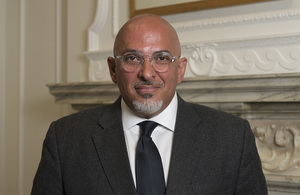More support to keep pupils in the classroom
Face-to-face education prioritised as it is important for pupils’ education and wellbeing

Thousands of new air filters and further temporary measures will be introduced to protect face-to-face education and minimise disruption, ahead of the pupils returning to the classroom this week.
Education Secretary Nadhim Zahawi has announced an additional 7,000 air cleaning units to be provided to early years, schools and colleges to improve ventilation in teaching spaces – further helping to strike the balance between managing transmission risk along with reducing disruption to in-person learning.
Face-to-face education remains a top priority, as the evidence shows it is the best place to be for children’s education and wellbeing.
To maximise the number of children in school and college for the maximum amount of time, the Government is temporarily recommending that face coverings are worn in classrooms and teaching spaces for students in year 7 or above, in light of the Omicron variant surge.
The advice is short term only to support pupils and teachers as they return to schools this term and builds on the existing proportionate guidance that recommends face coverings for all adults in communal areas of all settings.
The advice on face coverings in classrooms will be in place until the 26 January, when Plan B regulations are currently scheduled to expire, at which point it will be reviewed.
Education Secretary Nadhim Zahawi said:
Being in the classroom is undoubtedly the very best place for children and I’m looking forward to welcoming pupils back next week to continue their face-to-face learning, which is so important for their education and wellbeing.
There is no doubt that the Omicron variant presents challenges but the entire education sector has responded with a Herculean effort, and for that I thank each and every one of you.
The Prime Minister and I have been clear that education is our number one priority. These measures will bolster our support schools as we do everything in our power to minimise disruption.
Additional support for school leaders will also be in place, as Ofsted will not ask inspectors who are also school, college and early years leaders to undertake inspections, so they can focus on their leadership responsibilities at this critical time. This will be a temporary measure from the start of January.
Ofsted has already confirmed that it will not be inspecting secondary schools during the first week of term in January, as schools undertake on-site pupil testing.
Ofsted will also encourage early years settings, schools and colleges that are significantly impacted by COVID-related staff absence to ask for their inspection to be deferred.
The 7,000 new air purifiers will be for areas where quick fixes to improve ventilation are not possible, such as being able to open a window, and will help to improve ventilation in schools. This builds on the 1,000 air purifiers announced for special schools and alternative provision settings.
Feedback from schools suggests that the 350,000 carbon dioxide monitors rolled out across the country are also acting as a helpful tool to manage ventilation.